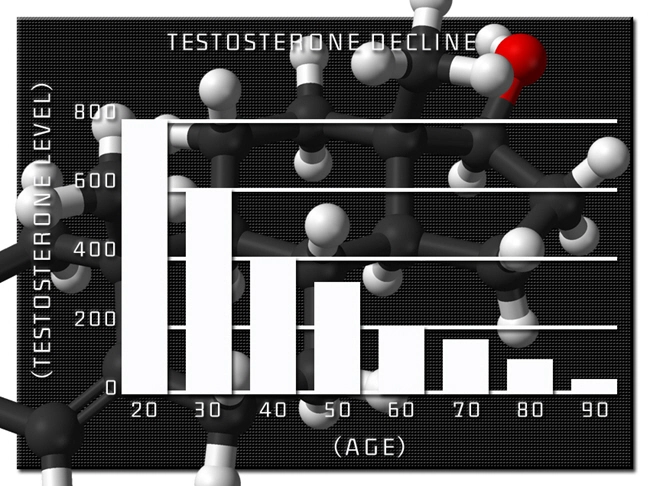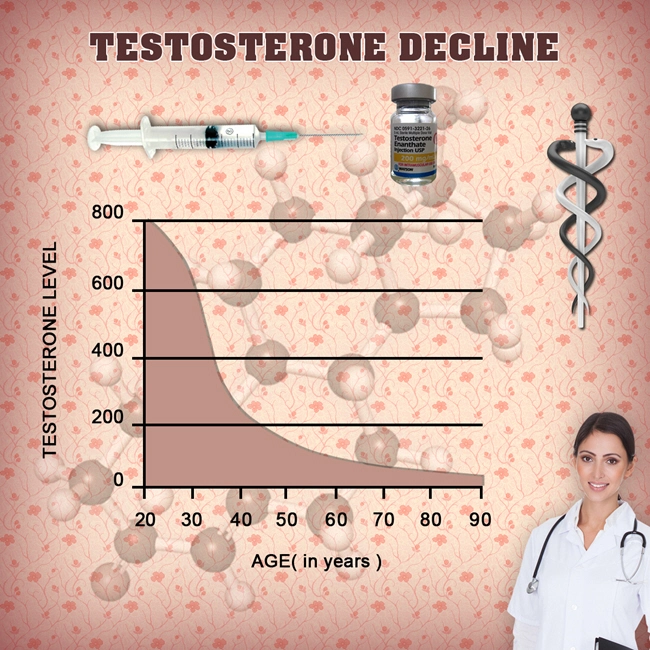
Introduction
Testosterone Deficiency Syndrome (TDS), also known as hypogonadism, is a clinical condition characterized by low levels of testosterone in the blood. This condition can significantly impact the quality of life of American males, affecting their physical, emotional, and psychological well-being. This article explores the multifaceted effects of TDS on different age groups of American men, shedding light on the comparative impact across these demographics.
Understanding Testosterone Deficiency Syndrome
Testosterone Deficiency Syndrome is a condition that arises when the body does not produce enough testosterone, a hormone crucial for male health. Symptoms of TDS can include reduced libido, erectile dysfunction, fatigue, depression, and a decrease in muscle mass and bone density. The prevalence of TDS increases with age, making it a significant concern for aging American males.
Impact on Younger American Males
In younger American males, typically those under the age of 40, TDS can have profound effects on their quality of life. This demographic often experiences a significant impact on their sexual health, with symptoms such as reduced libido and erectile dysfunction being particularly distressing. These symptoms can lead to decreased self-esteem and strained relationships. Additionally, younger men with TDS may experience increased fatigue and mood swings, which can interfere with their professional and social lives.
Impact on Middle-Aged American Males
For middle-aged American males, typically those between the ages of 40 and 60, TDS can manifest differently. This age group often experiences a gradual decline in testosterone levels, which can lead to a more subtle onset of symptoms. Middle-aged men with TDS may notice a decrease in energy levels, increased body fat, and reduced muscle strength. These physical changes can affect their ability to maintain an active lifestyle and may contribute to feelings of depression and anxiety. Furthermore, the impact on sexual health remains a significant concern, affecting their intimate relationships and overall satisfaction with life.
Impact on Older American Males
In older American males, typically those over the age of 60, TDS can have a more pronounced effect on their quality of life. This demographic is more likely to experience severe symptoms due to the natural decline in testosterone production that occurs with aging. Older men with TDS may suffer from significant muscle loss, increased risk of osteoporosis, and severe fatigue. These physical symptoms can limit their mobility and independence, leading to a decreased quality of life. Additionally, the emotional and psychological effects of TDS, such as depression and cognitive decline, can further exacerbate the challenges faced by older American males.
Comparative Analysis Across Age Groups
A comparative analysis of the impact of TDS across different age groups reveals distinct patterns. Younger men tend to experience more acute symptoms related to sexual health and energy levels, while middle-aged men face a broader range of physical and emotional challenges. Older men, on the other hand, are more likely to suffer from severe physical limitations and cognitive decline. Despite these differences, the overarching theme is that TDS significantly affects the quality of life of American males across all age groups.
Management and Treatment Options
Effective management of TDS is crucial for improving the quality of life of affected American males. Treatment options include testosterone replacement therapy (TRT), lifestyle modifications, and psychological support. TRT can help alleviate many of the symptoms associated with TDS, such as increased energy levels, improved sexual function, and enhanced mood. However, it is essential for patients to work closely with healthcare providers to monitor the effects of TRT and adjust treatment as necessary. Lifestyle modifications, such as regular exercise, a balanced diet, and stress management, can also play a significant role in managing TDS. Psychological support, including counseling and support groups, can help men cope with the emotional and psychological effects of the condition.
Conclusion
Testosterone Deficiency Syndrome is a significant health concern for American males, affecting their quality of life across different age groups. Understanding the unique challenges faced by younger, middle-aged, and older men with TDS is crucial for developing effective management strategies. By addressing the physical, emotional, and psychological aspects of TDS, healthcare providers can help improve the overall well-being of American males living with this condition.
Contact Us Today For A Free Consultation
Dear Patient,
Once you have completing the above contact form, for security purposes and confirmation, please confirm your information by calling us.
Please call now: 1-800-380-5339.
Welcoming You To Our Clinic, Professor Tom Henderson.

- Testosterone Deficiency in American Men: Symptoms, Diagnosis, and Holistic Management [Last Updated On: March 15th, 2025] [Originally Added On: March 15th, 2025]
- Managing Testosterone Deficiency in Aging American Men: Symptoms, Diagnosis, and Treatment [Last Updated On: March 18th, 2025] [Originally Added On: March 18th, 2025]
- Alcohol's Impact on Testosterone and Risk of Deficiency Syndrome in American Males [Last Updated On: March 19th, 2025] [Originally Added On: March 19th, 2025]
- Testosterone Deficiency Syndrome: Symptoms, Importance of Regular Check-ups, and Treatment Benefits [Last Updated On: March 19th, 2025] [Originally Added On: March 19th, 2025]
- Testosterone Deficiency in American Men: Symptoms, Diagnosis, and Energy Impact [Last Updated On: March 19th, 2025] [Originally Added On: March 19th, 2025]
- Stress and Testosterone Deficiency: Mechanisms, Evidence, and Management Strategies [Last Updated On: March 19th, 2025] [Originally Added On: March 19th, 2025]
- Testosterone Deficiency Syndrome: Symptoms, Diagnosis, and Hormone Therapy Benefits [Last Updated On: March 20th, 2025] [Originally Added On: March 20th, 2025]
- Testosterone Deficiency Syndrome: Impacts on Muscle Mass and Health in American Men [Last Updated On: March 20th, 2025] [Originally Added On: March 20th, 2025]
- Environmental Toxins and Testosterone Deficiency in American Males: Public Health Implications [Last Updated On: March 21st, 2025] [Originally Added On: March 21st, 2025]
- Testosterone Deficiency Syndrome: Impacts, Management, and Prostate Health Considerations [Last Updated On: March 21st, 2025] [Originally Added On: March 21st, 2025]
- Testosterone Deficiency Syndrome: Impacts on Skin Health and Management Strategies for American Men [Last Updated On: March 21st, 2025] [Originally Added On: March 21st, 2025]
- Smoking's Impact on Testosterone Deficiency in American Males: Risks and Management [Last Updated On: March 22nd, 2025] [Originally Added On: March 22nd, 2025]
- Testosterone Deficiency Syndrome: Impacts and Management of Joint Health in American Males [Last Updated On: March 22nd, 2025] [Originally Added On: March 22nd, 2025]
- Zinc's Vital Role in Treating Testosterone Deficiency Syndrome in American Men [Last Updated On: March 22nd, 2025] [Originally Added On: March 22nd, 2025]
- Testosterone Deficiency and Mood Disorders: Insights and Management for American Men [Last Updated On: March 22nd, 2025] [Originally Added On: March 22nd, 2025]
- High-Fat Diets and Testosterone: Impacts and Dietary Recommendations for American Males [Last Updated On: March 22nd, 2025] [Originally Added On: March 22nd, 2025]
- Testosterone Deficiency in American Men: Impacts on Cognitive Function and Health Strategies [Last Updated On: March 23rd, 2025] [Originally Added On: March 23rd, 2025]
- Diet Soda's Impact on Testosterone Levels in American Men with TDS [Last Updated On: March 23rd, 2025] [Originally Added On: March 23rd, 2025]
- Weight Training Benefits for Men with Testosterone Deficiency Syndrome [Last Updated On: March 23rd, 2025] [Originally Added On: March 23rd, 2025]
- Testosterone Deficiency and Depression: Understanding the Link in American Men [Last Updated On: March 23rd, 2025] [Originally Added On: March 23rd, 2025]
- Testosterone Deficiency Linked to Hearing Loss in American Males: Insights and Management [Last Updated On: March 23rd, 2025] [Originally Added On: March 23rd, 2025]
- Vitamin D's Role in Managing Testosterone Deficiency in American Males [Last Updated On: March 24th, 2025] [Originally Added On: March 24th, 2025]
- Testosterone Deficiency Syndrome: Impact on Libido and Health in American Men [Last Updated On: March 24th, 2025] [Originally Added On: March 24th, 2025]
- Testosterone Deficiency and Sleep Apnea: Interconnected Health Risks in American Males [Last Updated On: March 24th, 2025] [Originally Added On: March 24th, 2025]
- Testosterone Deficiency and Anemia: Understanding the Link and Treatment Options for American Males [Last Updated On: March 24th, 2025] [Originally Added On: March 24th, 2025]
- Testosterone Deficiency Impacts Body Composition in American Males: Health Implications [Last Updated On: March 25th, 2025] [Originally Added On: March 25th, 2025]
- Magnesium's Role in Managing Testosterone Deficiency in American Males [Last Updated On: March 25th, 2025] [Originally Added On: March 25th, 2025]
- Testosterone Deficiency Syndrome: Understanding Its Link to Hair Loss in American Men [Last Updated On: March 25th, 2025] [Originally Added On: March 25th, 2025]
- Chronic Illness and Testosterone Deficiency: Impacts and Management Strategies for American Males [Last Updated On: March 25th, 2025] [Originally Added On: March 25th, 2025]
- Testosterone Deficiency Syndrome: Impacts and Management in American Athletes [Last Updated On: March 26th, 2025] [Originally Added On: March 26th, 2025]
- Testosterone Deficiency in Men: Impacts on Vision and Eye Health [Last Updated On: March 26th, 2025] [Originally Added On: March 26th, 2025]
- Testosterone Deficiency Syndrome: Impacts on Immune Function in American Men [Last Updated On: March 26th, 2025] [Originally Added On: March 26th, 2025]
- Chronic Stress Impact on Testosterone Levels and TDS in American Males [Last Updated On: March 26th, 2025] [Originally Added On: March 26th, 2025]
- Pesticide Exposure Linked to Testosterone Deficiency in American Men: A Public Health Concern [Last Updated On: March 26th, 2025] [Originally Added On: March 26th, 2025]
- Shift Work's Impact on Testosterone Levels and TDS Risk in American Males [Last Updated On: March 26th, 2025] [Originally Added On: March 26th, 2025]
- Boron's Role in Managing Testosterone Deficiency in U.S. Males: A Promising Adjunct [Last Updated On: March 26th, 2025] [Originally Added On: March 26th, 2025]
- Testosterone Deficiency Linked to Kidney Health Risks in American Men [Last Updated On: March 26th, 2025] [Originally Added On: March 26th, 2025]
- Testosterone Deficiency in American Males: Impacts on Memory and Cognitive Health [Last Updated On: March 26th, 2025] [Originally Added On: March 26th, 2025]
- Testosterone Deficiency in American Males: Impacts on Dental Health and Management Strategies [Last Updated On: March 27th, 2025] [Originally Added On: March 27th, 2025]
- Soy Consumption and Testosterone Levels in American Men with TDS: A Comprehensive Analysis [Last Updated On: March 27th, 2025] [Originally Added On: March 27th, 2025]
- Blue Light Exposure and Testosterone Levels: Managing TDS in American Men [Last Updated On: March 27th, 2025] [Originally Added On: March 27th, 2025]
- Testosterone Deficiency Linked to Increased Gallbladder Disease Risk in American Males [Last Updated On: March 27th, 2025] [Originally Added On: March 27th, 2025]
- Plasticizers' Impact on Testosterone Levels and TDS in American Men: An Emerging Concern [Last Updated On: March 28th, 2025] [Originally Added On: March 28th, 2025]
- Heavy Metal Exposure and Its Impact on Testosterone Levels in American Men [Last Updated On: March 28th, 2025] [Originally Added On: March 28th, 2025]
- Testosterone Deficiency Syndrome: Impacts on Liver Health and Management Strategies [Last Updated On: March 28th, 2025] [Originally Added On: March 28th, 2025]
- Omega-3 Fatty Acids: A Promising Approach to Managing Testosterone Deficiency in Men [Last Updated On: March 28th, 2025] [Originally Added On: March 28th, 2025]
- Air Pollution's Impact on Testosterone Deficiency in American Males: A Public Health Concern [Last Updated On: March 28th, 2025] [Originally Added On: March 28th, 2025]
- EMFs and Testosterone: Understanding Impacts and Mitigation Strategies for Male Health [Last Updated On: March 28th, 2025] [Originally Added On: March 28th, 2025]
- Testosterone Deficiency and Thyroid Function: Interplay and Management in American Males [Last Updated On: March 30th, 2025] [Originally Added On: March 30th, 2025]
- Fenugreek: A Natural Remedy for Testosterone Deficiency Syndrome in American Males [Last Updated On: March 30th, 2025] [Originally Added On: March 30th, 2025]
- Testosterone Deficiency Linked to Pancreatic Health: Implications for American Men [Last Updated On: March 31st, 2025] [Originally Added On: March 31st, 2025]
- Testosterone Deficiency Syndrome: Impact, Diagnosis, and Management in American Men [Last Updated On: April 1st, 2025] [Originally Added On: April 1st, 2025]
- Testosterone Deficiency Syndrome: Impact of Adrenal Health and Holistic Treatment Approaches [Last Updated On: April 2nd, 2025] [Originally Added On: April 2nd, 2025]
- Noise Pollution's Impact on Testosterone Levels and TDS in American Males [Last Updated On: April 5th, 2025] [Originally Added On: April 5th, 2025]
- Tribulus Terrestris: A Natural Approach to Managing Testosterone Deficiency in American Men [Last Updated On: April 5th, 2025] [Originally Added On: April 5th, 2025]
- Testosterone Deficiency and Parathyroid Health: Impacts and Management Strategies [Last Updated On: April 7th, 2025] [Originally Added On: April 7th, 2025]
- Testosterone Deficiency Syndrome: Hypothalamic Role and Management in American Men [Last Updated On: April 7th, 2025] [Originally Added On: April 7th, 2025]
- Fluoride Exposure and Testosterone Levels: Implications for TDS in American Men [Last Updated On: April 7th, 2025] [Originally Added On: April 7th, 2025]
- Pineal Gland's Role in Testosterone Deficiency Syndrome Among American Males [Last Updated On: April 8th, 2025] [Originally Added On: April 8th, 2025]
- DHEA Supplementation: A Promising Treatment for Testosterone Deficiency Syndrome in Men [Last Updated On: April 9th, 2025] [Originally Added On: April 9th, 2025]
- Ginseng's Potential Role in Managing Testosterone Deficiency in U.S. Males [Last Updated On: April 9th, 2025] [Originally Added On: April 9th, 2025]
- BPA Exposure Linked to Lower Testosterone Levels in American Men: TDS Implications [Last Updated On: April 10th, 2025] [Originally Added On: April 10th, 2025]
- Testosterone Deficiency Syndrome: Impacts on Respiratory Health in American Males [Last Updated On: April 10th, 2025] [Originally Added On: April 10th, 2025]
- Phthalates' Role in Testosterone Deficiency Syndrome Among American Males [Last Updated On: April 11th, 2025] [Originally Added On: April 11th, 2025]
- PFC Exposure Linked to Testosterone Deficiency in American Males: Emerging Evidence [Last Updated On: April 12th, 2025] [Originally Added On: April 12th, 2025]
- Testosterone Deficiency Syndrome: Impacts on Gastrointestinal Health and Management Strategies [Last Updated On: April 13th, 2025] [Originally Added On: April 13th, 2025]
- Testosterone Deficiency in American Men: Impacts and Management of Urinary Health [Last Updated On: April 13th, 2025] [Originally Added On: April 13th, 2025]
- Testosterone Deficiency in American Males: Impact of Endocrine Disruptors and Mitigation Strategies [Last Updated On: April 15th, 2025] [Originally Added On: April 15th, 2025]
- Testosterone Deficiency Syndrome: Impacts and Management for American Males [Last Updated On: April 16th, 2025] [Originally Added On: April 16th, 2025]
- Testosterone Deficiency and Autoimmune Disorders: Impact and Management in American Males [Last Updated On: April 16th, 2025] [Originally Added On: April 16th, 2025]
- Cordyceps: A Natural Ally in Managing Testosterone Deficiency Syndrome [Last Updated On: April 17th, 2025] [Originally Added On: April 17th, 2025]
- Testosterone Deficiency in American Men: Impacts on Metabolic Health and Management Strategies [Last Updated On: April 17th, 2025] [Originally Added On: April 17th, 2025]
- Shilajit's Potential in Managing Testosterone Deficiency in American Men [Last Updated On: April 17th, 2025] [Originally Added On: April 17th, 2025]
- Testosterone Deficiency in American Males: Impacts on Neurological Health and Management Strategies [Last Updated On: April 18th, 2025] [Originally Added On: April 18th, 2025]
- Triclosan Exposure and Testosterone Levels in American Men with TDS [Last Updated On: April 19th, 2025] [Originally Added On: April 19th, 2025]
- Parabens' Impact on Testosterone Levels in American Males: Implications for TDS [Last Updated On: April 20th, 2025] [Originally Added On: April 20th, 2025]
- Phytoestrogens' Impact on Testosterone Levels in American Men with TDS [Last Updated On: April 20th, 2025] [Originally Added On: April 20th, 2025]
- Organophosphate Pesticides Linked to Testosterone Deficiency in American Males [Last Updated On: April 20th, 2025] [Originally Added On: April 20th, 2025]
- Lifestyle Factors and Testosterone Deficiency in American Males: A Multivariate Analysis [Last Updated On: April 21st, 2025] [Originally Added On: April 21st, 2025]
- Twin Studies Reveal Genetic and Environmental Factors in Testosterone Deficiency Among American Males [Last Updated On: April 22nd, 2025] [Originally Added On: April 22nd, 2025]








